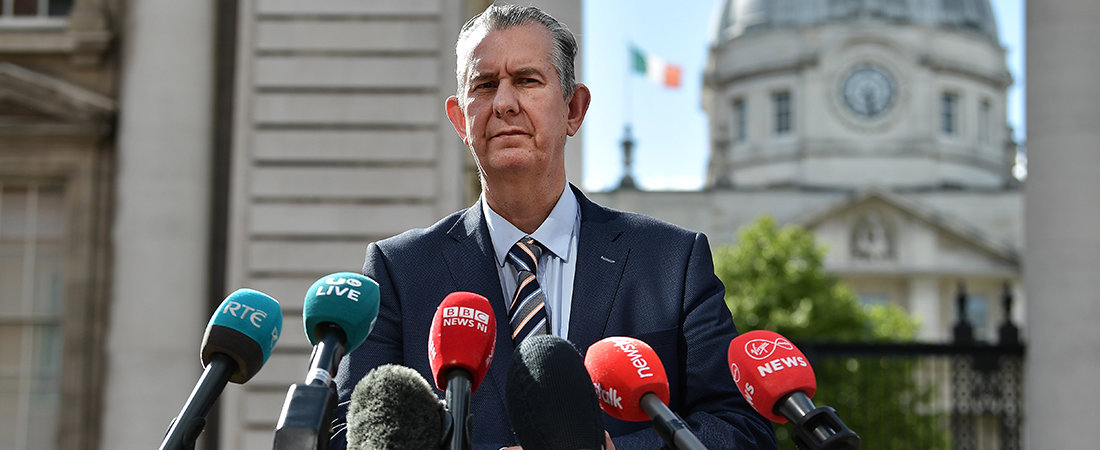34 days after ousting Arlene Foster and 21 days since assuming the leadership of the DUP, Edwin Poots has resigned. Even by Northern Ireland standards, the rapid developments have been incredible which leaves power-sharing on increasingly shaky ground. The implosion of the DUP and the instability which is mounting unfortunately places key legislation including reform to the health service, liquor licensing and gambling reform, and not least the economic recovery from Covid-19 in jeopardy.
It feels like a lifetime ago that Edwin Poots assumed the DUP leadership as the party seemingly drifted further to the right and by insisting, he would be a “listening leader” to DUP MLAs who felt their voices weren’t being heard during Foster’s leadership. However, the decision by the British Government to agree to the Sinn Féin request to introduce the Cultural Package agreed as part of New Decade, New Approach which includes provisions for the Irish Language at Westminster late on Wednesday night left the DUP representatives seething. Coupled with Poots decision to officially nominate Paul Givan as First Minister on Thursday without the party’s backing, this has brought about his early downfall.
Sir Jeffrey Donaldson who was narrowly defeated by Poots is the early frontrunner to replace him, but he would have to be co-opted to an Assembly seat. The difficult is that in the current climate there are no safe seats available, yet he appears the only candidate to steady the ship at this juncture. The surreal nature of the last few weeks even makes the potential return of Arlene Foster as First Minister a distant prospect – that really would be a political comeback like no other.
Regardless of who is leader of the DUP and Unionism more generally, they will face the same issues including the Northern Ireland Protocol which is unpalatable to this section of society, and elements of New Decade New Approach which were negotiated and agreed on the DUP’s watch.
For the time being, Paul Givan is likely to remain in place as First Minister alongside Sinn Féin’s Michelle O’Neill. Over the past 25 years, the DUP have built their electoral success on discipline and strong leadership – the events of the last number of weeks has demolished this and the probability of them being returned again as the largest party again looks increasingly doubtful. And yet, due to the tribal nature of politics in Northern Ireland, their political revival cannot be dismissed.
Brexit and more recently the Protocol has been an unmitigated disaster for Unionism with the tectonic plates radically shifting across the island of Ireland. Comments by the Irish Tánaiste (Deputy Prime Minister) Leo Varadkar this week who openly advocated his desire to see a United Ireland delivered and the growing conversations in civic society about what a “new Ireland” would look like is symbolic of this changing dynamic.
Although the next Assembly Election is scheduled for May 2022, the odds of an election this Autumn have shortened and Sinn Féin will be increasingly confident they can be returned for the first time as the largest political party. This would be a body blow to Unionism.
This move also places significant pressure on the Secretary of State, Brandon Lewis and the British Government. Having moved to quickly act on Irish Language, Unionist leaders will undoubtedly push hard to see strong action taken on the Protocol as a precondition for stabilising the Stormont ship. After sustained calls for Article 16 to be triggered and a summer of violence expected during the traditional marching season, the British Government could well judge that acting decisively now on the Protocol is the best option.
Yet, with the majority of political parties and businesses in favour of the Protocol it could well end up being the final nail in the coffin of power-sharing.
The future really is uncertain.

